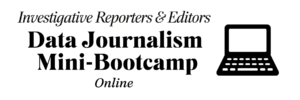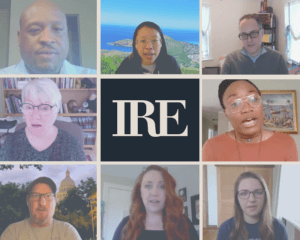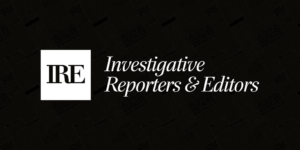Uncategorized
Eight journalists receive IRE fellowships
June 29, 2020 IRE recently awarded eight fellowships to upcoming Data Journalism Bootcamps thanks to the generosity of financial supporters. Recipients will either attend the August Online Data Journalism Bootcamp or the January 2021 Data Journalism Bootcamp. IRE is fortunate to have funding available to provide fellowships for financial assistance. Alexia Fernandez Campbell from the…
Read MoreIRE Executive Committee resigns, paving way for new election of board officers
The Executive Committee of the IRE Board of Directors sent the following letter to the full Board of Directors this afternoon: Dear members of the IRE Board of Directors: On Saturday, members of IRE elected one of the most diverse boards in its 45-year history. Seven members were elected to the board over the weekend,…
Read MoreIRE launches online Data Journalism Mini-Bootcamp in spreadsheets and data viz
Update (May 20): The first camp set for June 15-16 is sold out. Another mini-bootcamp will be offered online June 29-30. See below for registration details. Registration is open for IRE’s first-ever online mini-bootcamp in data journalism. In the bootcamp, which will be June 15-16, attendees will learn fundamentals of cleaning, analyzing and visualizing data…
Read MoreIRE membership: a ‘life vest’ in rough waters
Ron Campbell credits IRE for rescuing him after being laid off in 2014 from The Orange County Register. “I had a new full-time job within five months and I had part-time work within, literally, one week of my layoff,” he said. “Because I had developed skills sufficient that I could almost immediately find employment after…
Read MoreAnnouncing the 2019 IRE Award winners
Investigations that proved Russian jets bombed Syrian hospitals, documented dangerous solitary confinement of vulnerable immigrants, revealed conditions inside Amazon warehouses and uncovered sexual abuse of children are among the winners of the 2019 Investigative Reporters and Editors Awards. “This year’s entries were powerful examples of investigations that held institutions and people accountable,” said Jennifer LaFleur,…
Read MoreTop tips from health reporters and officials on covering COVID-19
In early March, we put together a panel at the 2020 NICAR Conference on how to cover the response to COVID-19. Although much has changed in the past month, there were some key takeaways from the panel that will ring true throughout the pandemic. Panelists Caroline Chen from ProPublica, Anna Barry-Jester from Kaiser Health News…
Read MoreSubmit your NICAR20 Lightning Talk ideas
Submissions are now open for Lightning Talks to be featured at #NICAR20 in New Orleans! Lightning Talks, which take place on the Friday afternoon of the conference, are five-minute talks about a particular tool, skill or piece of advice learned from working on stories. The goal is to teach some practical tips in a fun…
Read More2020 San Juan, Puerto Rico, Watchdog Workshop
Read in English Presentado por: Centro de Periodismo Investigativo (CPI) El IRE ofrecerá varias de sus sesiones de trabajo principales, diseñadas para mejorar tu habilidad de buscar en forma rápida información en Internet y encontrar documentos y datos que ayuden a añadir profundidad en tu rutina de trabajo para producir en un corto tiempo historias…
Read MoreCall for entries: 2019 IRE Awards
It’s time to gather your best stories of the year! The 2019 IRE Awards contest is now open for submissions, and we can’t wait to see what you’ve done. You’ll notice some changes to the number of or length of stories you can enter. Print entries are now limited to five primary pieces and audio and video…
Read MoreOpen call for IRE Award screeners
Want to get more involved with IRE but aren’t sure how? Consider volunteering your time as an IRE Awards screener. As a screener, you’ll be part of a team of journalists looking for the best investigative reporting in a single category, which means that you may have to read, listen to, or watch a couple dozen…
Read More 12/17/25: We're aware of a bug that is preventing some users from logging in. We'll post an update here when it's fixed.
12/17/25: We're aware of a bug that is preventing some users from logging in. We'll post an update here when it's fixed.






